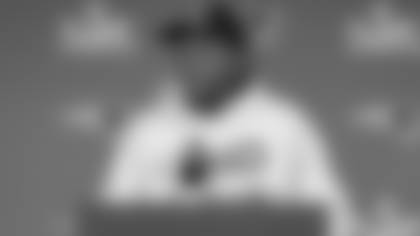HEAD COACH BILL BELICHICK
PRESS CONFERENCE
Friday, October 8, 2021
On what made him want to bring back Jamie Collins:
BB: Well, Jamie [Collins] has experience in our system. I feel like he gives us some depth at that spot. He has some versatility, so we'll work through it here and see how it goes.
On if there is a chance Collins can play on Sunday:
BB: We'll see. I think that really depends really on how things go today, and then we'll talk about the roster and all that after today's practice and tomorrow.
On the team's receivers this year:
BB: Well, I'm glad we have all of them. I think they've all contributed. Done a good job. Certainly, they give us some depth and quality at that position along with Jakobi [Meyers]. It's been good to get N'Keal [Harry] back. So those have all been positives. I think Hunter [Henry] and Jonnu [Smith], KB [Kendrick Bourne] and Nelly [Nelson Agholor] have all helped us, and they do different things, but they complement each other, and I think the more time we spend together and the more time they work with Mac [Jones], who is another part of this, that'll continue to move in a positive direction as it has so far.
On new players getting acclimated to the team's system:
BB: Well, there's always a big benefit to experience in general, but more importantly, experience in a system and experience working with those players that you mentioned. Whether it's the receivers and tight ends, or whether it's the quarterback and the timing of routes and so forth, but there's different distributions and meshes and releases, things like that, that the receivers themselves are involved in, and there's the timing of the quarterbacks, and then there's the overall offensive system. I think that's continued to get better every week. We had a couple of weeks in the preseason where we didn't have everybody available, and we were working Cam [Newton] and Mac [Jones] both at quarterback, but as things have stabilized here in the last few weeks, I think that's definitely trending in the right direction, and the production has generally followed that, and we still have a long way to go, but I think that's moving in the right direction, but again, offensively, it takes all 11 guys. It's not just about a quarterback and a receiver, so just overall, offensively, our production and execution can move to a higher level as well, so that includes everybody.
On who might be starting on the offensive line on Sunday and his level of concern with the offensive line:
BB: I think today will help clear some of that up, but whoever has the opportunity, I'm sure they'll make the most of it, and I know the guys that have been at practice are working as hard as they can to be ready to go, and the guys that did are, likewise, preparing, and if they get the opportunity, I think they'll be ready to go too, so we'll see how it all plays out. I don't know.
On if he has anything else to say about the Stephon Gilmore trade:
BB: No. I've had my comments on Steph [Gilmore]. Nothing has changed there, certainly. I was being questioned about the process of us parting ways and so forth, and it ended up the way it did, but I wouldn't have been able to say that at that point in time, and so I didn't want to mislead anybody or say something then have to retract it. I know you want all the up-to-the-second information, but sometimes things just aren't finished at a particular point in time when I'm available or you ask the question, so rather than give the wrong answer, I'd rather wait and let things develop and be accurate.
On how the team's defense can generate more fumbles:
BB: That's a good question. I think that's a lengthy answer. I mean, first of all, if you look at the majority of the fumbles, there's a high percentage of them that come at the quarterback position. Some of those are in the act of throwing or in the pocket or that kind of thing, so that's kind of, I would say, a whole different category. When you look at other fumbles by running backs or tight ends and receivers, generally speaking, after they have caught the ball, they kind of fall into another category, too, but to your point, there's a balance between just grabbing at the ball and missing tackles and then there's -- say you get into situations like Damien's [Harris] touchdown against the Jets. The Jets are a good ball disruption team, and they try to tackle the ball, and Damien [Harris] was able to get through a couple of those tackles and score, so I think the best way to cause fumble opportunities is to, as part of the tackle, try to put pressure on the ball, or for the second or third player in, to try to get the ball out, and then you have the situations where the runner can't see the tackler, coming from behind or coming from the side, where the runner's really not looking. Sometimes there's opportunities there. I think our players are aware of it. I think there are a lot of good examples where they are trying to get it out. Some of that has to do with the good or not so good ball security that the guys who have the ball are using, so a combination of all those things, but we want to try to force that out as much as we can, and I'll say some players are more vulnerable to having the ball dislodged from them than others are, but we want to try to attack all of them. You never know when somebody's going to slip up a little bit and give you that opportunity.
On how the team can generate more yards after the catch:
BB: Well, I think any player that has the ball, there's a certain amount of yards, let's call it, that are going to be a result of the actual play, so how a run is blocked, how deep the receiver catches the ball, whatever position the player plays where the receiver catches the ball, is he 15 yards down field? Is he three yards down field? Whatever it is, then there's a certain amount of yards, I would say, that would go with that play based on the position and the leverage of the players around them. Then, I think the real question is how much does the player with the ball gain, let's call it, on his own from where he could've been tackled or should've been tackled, let's say, to what he actually gets on the play? I think there's a lot of different ways to. It's a little bit subjective, but I think there's different ways to look at that, so if a runner gets hit and is able to drive forward for three extra yards versus getting driven back, then that's three extra yards that I would say he gets on his own, or a player catches a pass and looks like he's in a situation where he either could or should be tackled, but he's able to avoid or break that tackle and gain extra yards beyond that, then those are yards on his own. I think if you just throw the ball to somebody, and there's nobody within 10 yards of him and he runs 10 yards and gets tackled, that's a lot different than 10 yards of there's a guy right there to tackle him on the 30-yard line, and he avoids him or breaks the tackle and gets to the 40 [yard line]. Those 10 yards are a little bit different than the way I and the way we look at that. Sometimes the yards after catch come as part of the running or skill of the player in the open field, but sometimes the real tell of it is how much the player gains with the ball in his hands after somebody has a chance to tackle him.
On if the players having more chemistry with each other will help generate more yards after the catch:
BB: I think we're not in a bad spot there. I think, generally speaking, Mac [Jones] puts the ball in a place where the receivers can run with it. I mean, if you're a receiver running a crossing pattern, a ball is thrown behind you where you have to turn around, stop, catch it, that hurts your opportunity to run with the ball. If you catch the ball in stride and are able to maintain the momentum and the separation you've created in the route, then that enhances your run-after-catch opportunities, and that's really a focus and relative to the accuracy and placement of the ball by the quarterback more than it could be by the ability of the runner at that point. Now, once the player gets the ball and starts running with it, then it totally falls in the hand of the guy carrying the ball. Again, I think there's a number of different ways you can look at that, but overall, I think Mac's [Jones] been pretty accurate so that the receivers haven't had to work excessively to just make the catch. He puts them in that position, and then it's really up to them to gain yards. We work on those running drills every day, and I think there are a lot of good examples of players gaining extra yards based on good running skills, and then there are other examples where we could get a little more out of it sometimes, so we talk about that, and I think the players understand that, and they've got to make quick decisions as to what is the best way to gain yards. We're all trying to gain yards, but there's definitely a skill to that, and we work on it on a regular basis. I hope that answers the question.
On how practice squad players prepare for games when they do not know if they will be playing:
BB: I think anybody that's been around the National Football League very long, and certainly around our team very long, knows that things can happen quickly. Things can happen from Wednesday to Thursday, from Friday to Saturday. Sometimes from Saturday to Sunday. That's the nature of the National Football League. Things change. Certainly, we're in a situation now, for example, Covid, but it can come up on just a regular flu or upset stomach or a variety of things. An injury can get aggravated late in the week, so all of our practice squad players are instructed and coached every week like they're going to play. I learned a long time ago that being prepared and not getting the opportunity in the long run is still a very valuable exercise. Then, when you do get the opportunity, those other times that you've prepared will just help you prepare better during this time that you actually get it, so I think that's really the mindset that the practice squad players do work with and are told to work with. The decision of whether active or not is not something they can control. That's out of their hands. What they can control is their preparation and their performance when they get a chance and that's really what they should hopefully focus on. That's really how we handle it. They should be prepared whether they get the opportunity or not. Not the reverse of, "I'm not going to do anything and then get the opportunity, and now, all of a sudden, I'm going to try and put my foot on the gas and push it all the way down." That's just not a good way to, I would say, prepare to prepare.
On what he looks for in a non-quarterback player to feel comfortable in calling a pass play for that player to throw the ball:
BB: Well, you look for a player who would make good decisions and is accurate. Former college quarterbacks or guys who at least have some experience seeing if the receiver is covered or he's open. It's not a one-time thing. They've done it before. So, guys like Julian [Edelman] or Jakobi [Meyers] or players like that that played that position in college. You need for him to see if the receiver is open and not just throw it there because that's where the dotted line on the page is put. Then, if he's open, being able to put it on him and be accurate, so again, players like Kevin Faulk and Julian [Edelman] and Jakobi [Meyers] and guys like that that have those skills and those abilities are kind of the guys you want to throw the ball. You don't want to just throw it up there for grabs and turn the ball over, but if the play design works and the players are open, you want somebody that can put it on them.





































